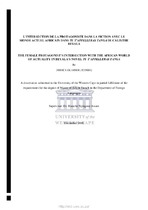| dc.description.abstract | In order to overcome the silence that had been instilled by colonialism, several postcolonial
female writers employ fiction to restore their local culture and reflect on their representation
in historical writings. For female writers, literature often becomes a medium through which
they can become active agents of their own destiny by establishing a voice for themselves.
Writing becomes a means of reclaiming traditional discourses relating to women.
The following study is primarily focused on Calixthe Beyala, a Franco-Cameroonian
novelist, and specifically concentrates on the manner in which Beyala makes use of her
female protagonist in Tu t’appelleras Tanga to portray the realities facing African
Francophone females. The study aims at illustrating that the female protagonist plays a
critical role in mirroring both the conditions of females in African societies and the
conditions pertaining to Womanism in a universal context. Through the analysis of the role of
the protagonist, the study reveals that there seems to be a relationship between fiction and
society which is definite enough for fictional characters to be used as prototypes for social
roles and attitudes.
In order to further investigate the manner in which African actualities are able to exist in
fictional narratives, the study draws an extensive comparison between the fictional narrative
Tu t’appelleras Tanga and selected non-fictional Cameroonian laws dating from 1980 to
2017. By addressing the intentions of fictional narratives, the study reveals a possible
association between Beyala’s fiction and the African world of actuality relative to the African
females’ predicament that is associated with patriarchal dominance, prostitution, the lack of
agency as well as economic exploitation.
To conclude, the paper maintains that Francophone African female novelists, and, in
particular, Beyala, make use of fictional narratives to not only highlight the pivotal issues
regarding the status of African women but also creates a voice for future female generations
to become empowered through the act of narration. | en_US |

